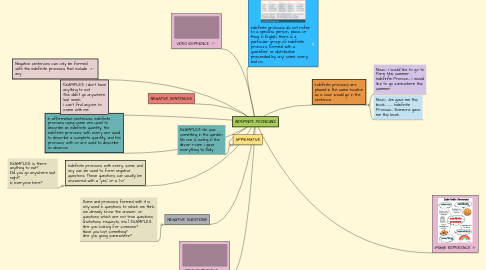INDEFINITE PRONOUNS
作者:Marvin Paiz

1. Indefinite pronouns with every, some, and any can be used to form negative questions. These questions can usually be answered with a "yes" or a "no"
1.1. EXAMPLES: Is there anything to eat? Did you go anywhere last night? Is everyone here?
2. In affirmative sentences, indefinite pronouns using some are used to describe an indefinite quantity, the indefinite pronouns with every are used to describe a complete quantity, and the pronouns with no are used to describe an absence.
3. EXAMPLES: I don't have anything to eat. She didn't go anywhere last week. I can't find anyone to come with me.
4. Negative sentences can only be formed with the indefinite pronouns that include any.
5. Indefinite pronouns do not refer to a specific person, place, or thing. In English, there is a particular group of indefinite pronouns formed with a quantifier or distributive preceeded by any, some, every and no.
6. VIDEO REFERNCE
7. AFFIRMATIVE
7.1. EXAMPLES: He saw something in the garden. No one is eating in the dinner room. I gave everything to Sally.
8. NEGATIVE SENTENCES
9. NEGATIVE QUESTIONS
9.1. Some and pronouns formed with it is only used in questions to which we think we already know the answer, or questions which are not true questions (invitations, requests, etc.) EXAMPLES: Are you looking for someone? Have you lost something? Are you going somewhere?
10. VIDEO REFERENCE
11. Indefinite pronouns are placed in the same location as a noun would go in the sentence.
11.1. Noun= I would like to go to Paris tjhis summer. Indefinite Pronoun= I would like to go somewhere this summer.
11.2. Noun= Jim gave me this book.............. Indefinite Pronoun= Someone gave me this book.
12. IMAGE REFERENCE


